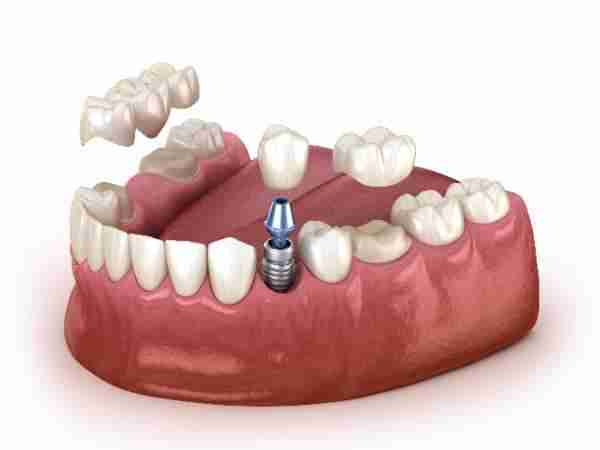A dental implant is a small titanium post inserted into the jawbone, designed to replace a missing tooth root. It provides a stable foundation for a crown, bridge, or denture, restoring both function and appearance. Known for their durability and natural feel, dental implants are a popular choice for long-term tooth replacement. Placing an implant too early can lead to complications as the bone continues to grow. That’s why careful timing and expert guidance are essential before moving forward with treatment in younger patients.
Why Age Matters in Dental Implants
The most critical reason why dental implants aren’t typically recommended for younger patients is that the jaw is still growing. In teenagers and children, facial bones—including the jaw—continue to develop until the late teens or early twenties. If a dental implant is placed before growth is complete, it can shift out of place as the jaw develops, leading to complications in both function and aesthetics.
When Is It “Too Young” for an Implant?
Growth Completion First
So, when is someone too young? There’s no exact age for everyone, but generally:
- Girls may complete jaw growth around age 17–18
- Boys may complete growth closer to age 18–21
Each case needs individual evaluation. Dentists often use X-rays or 3D scans to determine whether the jawbone has stopped growing.
Exceptions to the Rule
There are rare cases where an implant may be considered earlier, especially if:
- The missing tooth is causing emotional or social challenges
- There’s a congenital absence (e.g., a missing adult tooth that never formed)
- Other solutions, like bridges or dentures, are unsuitable or cause discomfort
However, in such cases, any solution is usually temporary until the jaw finishes developing.

What Can Be Done in the Meantime?
While waiting for dental growth to complete, patients have options to manage the gap:
- Removable partial dentures – Custom-fit and easy to adjust
- Orthodontic solutions – Braces or aligners can sometimes manage space
- Temporary bridges – Bonded to adjacent teeth but designed not to affect jaw growth
Your dentist in Wolverhampton can guide you through these alternatives and tailor a plan to your needs.
Risks of Early Implants
It’s tempting to want a permanent fix quickly, especially for young people dealing with self-esteem issues. But early dental implants can come with serious downsides:
- Misalignment due to ongoing jaw development
- Gum recession or bone loss around the implant
- Cosmetic issues like implant being too short or out of line with other teeth
- Cost of corrective surgeries or removals later on
This is why most experts recommend waiting, even when temporary solutions feel inconvenient.
What Happens During a Dental Implant Process?
Consultation and Assessment
When you visit a dentist in Wolverhampton for a consultation, they’ll start by assessing bone health, jaw development, and overall oral condition. Imaging tools such as panoramic X-rays or CBCT scans are standard.
Bone Grafting (If Needed)
In some cases, especially where a tooth has been missing for a while, the jawbone may have shrunk. Your dental implant Wolverhampton provider might suggest bone grafting to build up the area before placing the implant.
Implant Surgery and Recovery
The implant is placed surgically into the jawbone and allowed to fuse (osseointegration), which can take several months. Once healed, a crown is attached to complete the smile.
It’s a highly successful procedure, with studies showing over 95% success rates over 10 years when done under the right conditions (source: American Association of Oral and Maxillofacial Surgeons).
The Emotional Side of Waiting
Many parents and teens feel frustrated when told they have to wait for an implant. Social pressure, school photos, and peer comparisons make even a small gap feel huge. Dental professionals and families need to approach this sensitively.
Having open conversations and a clear roadmap can make a huge difference. A supportive dentist in Wolverhampton will involve both parent and child in the decision-making process, helping the patient feel heard and cared for.
Implant Timing After Accidents or Sports Injuries
Teenagers are especially prone to dental trauma—whether from sports, falls, or other accidents. Losing a tooth early can be devastating. While it might seem like a good idea to replace it right away, the same principles apply: jaw growth must be complete first.
In these cases, your dental implant Wolverhampton specialist might place a temporary prosthesis or spacer to hold the gap and prevent neighbouring teeth from shifting.
What If the Patient is Older Than Average?
Not every 18-year-old has finished jaw growth, just as some 16-year-olds might be nearly done. That’s why the age isn’t a fixed number. It’s always about the individual—their development, dental health, and emotional readiness.
This is where personalised care comes in. A thoughtful dentist in Wolverhampton will use not just age, but diagnostic tools and experience to determine the right time for treatment.
Other Considerations Before Getting a Dental Implant
Besides age, there are other factors that determine implant suitability:
- Gum health – Active gum disease must be treated first
- Oral hygiene – Commitment to good daily habits is essential
- Smoking – Can increase implant failure rates
- Medical conditions – Diabetes, immune issues, and certain medications may require extra planning
Your dental implant Wolverhampton expert will walk you through each of these during the consultation.

Final Thoughts: The Right Time, the Right Care
Getting a dental implant is not just a medical procedure—it’s a life choice. For young people especially, timing is everything. While it may be hard to wait, the benefits of placing an implant at the right time far outweigh the risks of going too soon. With the right care and a supportive team, young patients and their families can navigate this journey with confidence and clarity. Trust your dental team to help you make the best long-term decision—because your smile is worth the wait.

